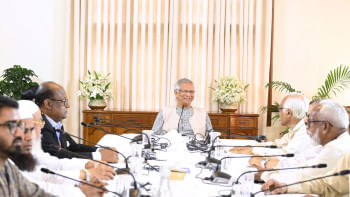Clowns bring laughter to traumatised Rohingya kids

The Rohingya boys and girls shrieked with delight as the clowns juggled hoops and somersaulted, their red-nosed antics provoking a sound rarely heard in the world's largest refugee camp -- children's laughter.
The clowns have been providing much-needed levity in the crowded camps, where hundreds of thousands of traumatised Rohingya children spend long days in difficult conditions.
Mohammad Noor lives with his mother and three siblings in a makeshift shanty in the teeming Kutupalong camp, where a lack of food and water means a constant struggle to survive.
The 10-year-old fled Myanmar last month after his father was killed in brutal violence by the army that the United Nations has likened to ethnic cleansing.
The impromptu circus in a dusty clearing is a welcome distraction from the horror at home.
"It is hilarious. I have never seen anything like it. My friends and I were just laughing and laughing," he told AFP, as a quartet of painted clowns performed skits before a huge gathered crowd.
Theatre groups in Bangladesh have a record of using "drama therapy" to lift spirits in the most depressing of circumstances.
One troupe performed for the survivors of a factory collapse in 2013 that killed 1100 garment workers, while another hosted shows in a small village in Bangladesh's south that lost nearly 50 children in a tragic road accident.
"Our sole aim is to bring laughter to the Rohingya," said Rina Akter Putul, a veteran acrobat and the lone female member of the group.
"Making people laugh is a tough job, especially for those who lost their parents in the conflict."
But it's not just the children who benefit from the visiting performers.
"We hardly have any fun," said Nesar Ahmed, 38. Even during major Islamic festivals and weddings, there is little in the way of entertainment, he added.
"Life in Arakan [Rakhine] is grim," Khairul Amin, a 63-year-old grandfather, told AFP as a boisterous crowd, young and old, jostled to meet the visiting clowns.
"There is no television and no cinema or theatre. And there is this constant fear you'll be killed or arrested by the military."
Seated for the show with her youngest child on her lap, Rehana smiled, saying: "Never in my life have I had such fun."

 For all latest news, follow The Daily Star's Google News channel.
For all latest news, follow The Daily Star's Google News channel. 



Comments